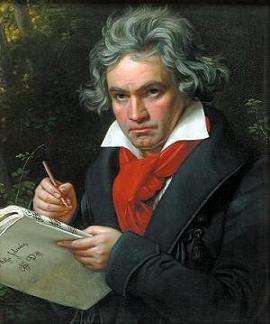Grant Park Season Finale: Beethoven's Ninth
By Alexander Hough in Arts & Entertainment on Aug 13, 2009 7:20PM
Even if you've never been to a performance of Ludwig van Beethoven's Ninth Symphony, you're familiar with the piece. At some point, and probably recently, you've heard the finale's "Ode to Joy" theme, the initial fragment from which Beethoven developed his last symphony. It's been used everywhere from the Olympics (performed at most Games since 1956, including as the temporary national anthem of the unified German teams of the 1950s and 1960s, the unified post-USSR team in 1992, and, for a half dozen years, of Rhodesia, until it became Zimbabwe in 1980); to church services (the hymn "Joyful, Joyful, We Adore Thee"); to movies ("A Clockwork Orange," "Help!," and "Die Hard," to name a few). Parts of the rest of the symphony pop up in similarly varying locations; samples from the Scherzo appear as a stock sound in Microsoft XP and as introductory music in "Countdown with Keith Olbermann" (which itself is a tribute to the excerpt's use in "The Huntley-Brinkley Report").
Within the music world, it's hard to overstate the influence of the Ninth. The piece dramatically expanded the form, content, and length of the symphony, but the power of the piece goes beyond technicalities. The Ninth left an indelible impression on subsequent composers. Johannes Brahms, born six years after Beethoven's death, didn't finish his First Symphony until he was forty-three, largely because he was intimidated by writing in Beethoven's shadow. The symphony Brahms ended up producing is a masterpiece - with a final movement that sounds an awful lot like the final movement of Beethoven's Ninth. Gustav Mahler, not exactly a paragon of sanity to begin with, became wildly paranoid about an otherworldly significance of Beethoven's nine symphonies, believing he would die after he finished his own Ninth Symphony. And, actually, he did; it was the last piece Mahler completed before succumbing to a blood infection.
There is, of course, a very good reason the Ninth remains not only a centerpiece of the Western musical canon but also firmly lodged in our cultural psyche, and the most expedient way to understand that reason is to go straight to the source and hear the Grant Park Orchestra and Chorus play the piece in its entirety this Friday and Saturday. These concerts wrap up the Grant Park Music Festival's 75th season, so soak up Millennium Park, the summer, and Beethoven while you can.
Jay Pritzker Pavilion in Millennium Park, Friday, August 14, at 6:30 p.m., and Saturday, August 15, at 7:30 p.m., FREE
